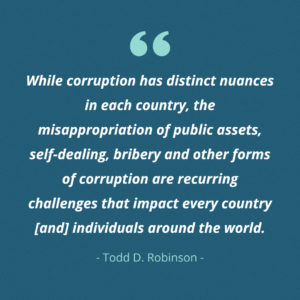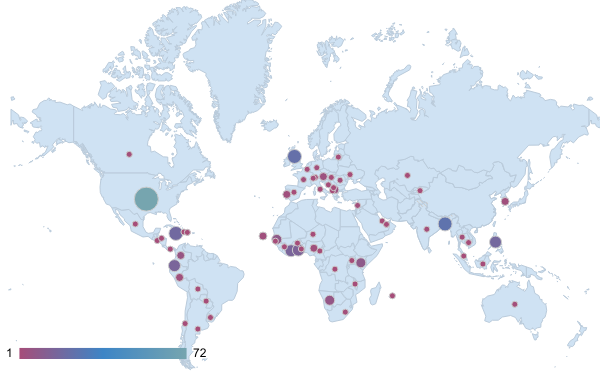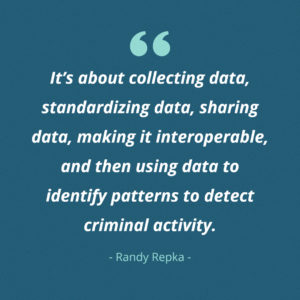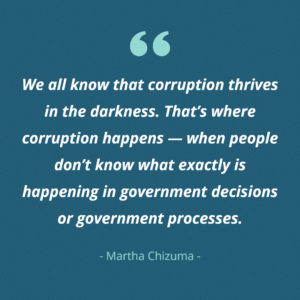By Joe Adler • August 11, 2022
Corruption inhibits free and fair governments. Ending kickbacks, bribery and other types of corrupt behavior is crucial for democracy to take hold and grow around the world.
In some developing nations, a new generation of politicians and public servants are disrupting traditional models of corruption. But their courage can only go so far. At the heart of most corruption is a web of bribes and other financial dealings that enrich bad actors while depriving the public of economic justice. New technology to capture, analyze and share data about such financial activity is a key weapon in the corruption fighter’s arsenal.

Promoting these data analysis tools was the focus of the global Anti-corruption Solutions through Emerging Technologies (ASET) TechSprint held in June by AIR — Alliance for Innovative Regulation, in partnership with the U.S. State and Treasury departments.
Five teams competing in the four-day TechSprint June 21-24 demonstrated possible solutions for improving transparency, due diligence and risk management in processes for grants applications, disaster relief building contracts, maritime cargo shipments, mining and other business sectors susceptible to corruption.
The ASET program, which will include a follow-up TechSprint, was one of the initiatives that grew out of the Biden administration’s Summit for Democracy, a global virtual event hosted by the U.S. in December to focus on defending against authoritarianism and corruption and on advancing respect for human rights. A second Summit for Democracy is planned in early 2023.
“While corruption has distinct nuances in each country, the misappropriation of public assets, self-dealing, bribery and other forms of corruption are recurring challenges that impact every country [and] individuals around the world,” said Todd D. Robinson, Assistant Secretary of State for International Narcotics and Law Enforcement, speaking during a fireside chat on the TechSprint’s last day, when the teams unveiled their solutions. “The consequences of these acts cross national borders and can take root in economies and political systems far from their origin.”
The event, webcast on a virtual platform, also featured guest appearances by young leaders who have taken strong stands against corruption in their respective countries. They included a government official in Malawi who has faced threats and harassment for demanding justice and fairness in the handling of public finances, and the mayor of a Filipino city who has prioritized transparency and anti-corruption initiatives.
“Technology is one of the many tools in the tool box for fighting corruption. But at the end of the day, it’s people coming together to get this thing done,” said Rushka Tcholakova, a project leader for AIR who helped organize the TechSprint.
The ASET TechSprint demonstrated the power of AIR’s strategy to hold hackathon-style competitions to develop digital solutions for financial regulators and law enforcement. It was held on the heels of a TechSprint that AIR helped organize in May with India’s Reserve Bank Innovation Hub to promote digital financial tools for women.
The ASET event engaged 27 sprinters, 16 scrum masters and experts, and seven judges, representing 15 nations. The five teams were given three days to develop prototypes in one of four areas: using data to detect possible corruption; data interoperability and consistency; monitoring activities and metadata related to procurement and selling natural resources; and identifying beneficial owners of business enterprises.

Over 370 attendees spanning more than 70 nations tuned in to webinars about the global fight against corruption, which covered topics such as multilateral cooperation and the recent standards issued by the Financial Action Task Force’s (FATF’s) on combating financial crime.

The TechSprint recognized three winning solutions. Team Gamma’s prototype offered an AI solution to improve the due diligence process in awarding government grants. Team Chains of Corruption proposed using smart contracts and satellite imaging to improve transparency in disaster relief building contracts. The Finding Meno team created a risk-scoring model to help authorities focus on higher-risk activities in maritime cargo shipping.
Randy Repka, AIR’s global director of TechSprint strategy, noted that all five teams focused on different types of corruption. In addition to the winning prototypes, a fourth team developed a data portal to document mining activities, while a fifth created a sector-agnostic platform to detect, report and block different types of fraud and corruption.
“When you look across the five winning teams, you see that there is no broad sweeping solution for corruption,” Repka said. But she added that the common thread to all was the need for better data. “It’s about collecting data, standardizing data, sharing data, making it interoperable, and then using data to identify patterns to detect criminal activity,” she said.
AIR and its government partners will develop a second anti-corruption TechSprint leveraging the key takeaways from the first event.
Going forward, the organizers will assess the viability of all five prototypes. The team members, who are not part of any single organization but rather met for the first time at the TechSprint, will be invited to continue their engagement. AIR will enlist a panel of experts to review the concepts and advise State and Treasury on which anti-corruption solutions to pursue as open-source blueprints for interested nations to adopt. Channeling these solutions into open-source computer code will enable cost-free adoption by other governments and private organizations, accelerating anti-corruption progress worldwide.
“The competition phase is over. It’s now time for collaboration,” said Repka.
Aside from the competition, the TechSprint also featured powerful accounts of anti-corruption efforts by courageous young leaders in developing nations.

Martha Chizuma, Director General of the Anti-Corruption Bureau in Malawi, has faced a backlash over her focus on officials mishandling public finances regardless of their political party. She noted that corrupt leaders rely on today’s default situation, in which most citizens lack good public information about government activities.
“We all know that corruption thrives in the darkness. That’s where corruption happens — when people don’t know what exactly is happening in government decisions or government processes,” Chizuma said.
“We have a big part of the population whose immediate need is not a phone, is not to be connected to the internet. It’s food for today. It means that you have a whole population that does not know how government processes are going about, how government is probably spending the public finances.”
The ASET project aims to shine a light on these dark places by making corruption-prone activities transparent.

Note: This initiative was funded by a grant from the United States Department of State. The opinions, findings and conclusions stated herein are those of AIR and do not necessarily reflect those of the United States Department of State.
Stay informed by joining our mailing list